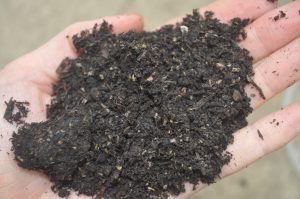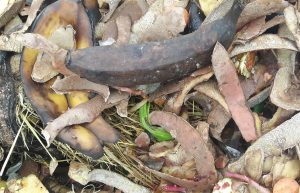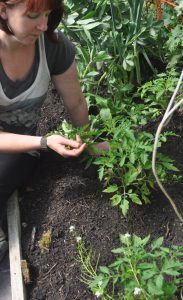If you want to feel better in this increasingly worrying world in which we reside then go and stick your hands in some good honest soil. Forget about gloves, and everything else you have going on in your life, and get stuck in. Pick some up, run it through your fingers and get connected because the healthier the soil, the healthier your plants. It’s as simple and indeed wondrous as that.
Most of us will be familiar with the saying; ‘you are what you eat’. Yet research by Newcastle University in 2015, showed that organic produce could be up to 60% higher in a number of key antioxidants compared to conventionally-grown produce. So please lock away the pesticides and weed killers which will ultimately damage your soil. Unless that is you want to be left with a sterile, shell of a plot that has to be forced into production each year with a combination of hard graft and an array of expensive fertilisers.
Instead focus on making your ground as robust and nutrient-rich as it can be and you will be rewarded tenfold in the long term.
 Here are just of the best ways to supercharge your soil naturally:
Here are just of the best ways to supercharge your soil naturally:
First off, get to know your soil
Have a look at it. Lots of earthworm activity is one of the best indicators of health. What other critters can you see? Getting up close and personal in this way enables you to see properly what you’re working with.
A thick mulch of gardeners’ black gold is the finest cure-all for any garden. It encourages the true heroes of soil (earthworms and beneficial microbes) to move in, which in turn will work to the benefit of your plants. It is truly invaluable. Organic, humus-rich ground will have an improved structure which enables it to hold and retain much more water than it would do otherwise. It will also help reduce any nutrient wash off that can occur so it’s an important asset in the battle against future climate change extremes.
Speaking of which, help your compost go further
By way of a little compost brewing (tea making) you will be able to feed, and greatly expand the population of beneficial micro-organisms in your compost so they can be used over a much wider area. There’s a lot of complicated science on the subject but suffice to say the end result is akin to a probiotic boost for your plants.
Put down that fork and dig less
This low maintenance form of gardening has many benefits. No-dig gardening guru, Charles Dowding believes that breaking the capillary structure of topsoil is damaging, and gives the example of mycorrhizal fungi, which when left undisturbed can enable plants to find and absorb water.
Also if you weed by hand you see so much more and there’s much less risk of damaging some of the creatures you might otherwise not even know were there. I have lots of newts, frogs and toads living in my polytunnels and I’ve lost count of the number of times I’ve had the pleasure of coming across one as I garden. There are also many more beneficial insects besides that can scared off, or at worse seriously hurt by rigorous digging.
Keep the ground covered
If soil is left bare over winter this is when the most damage can occur as it will be vulnerable to the elements and erosion can likely set in. So fill any empty patches with a green manure. Weeds will even provide some protection, although you don’t want an invasive variety taking hold the following year.
The Soil Association recommends aiming for continuous vegetation coverage as much as possible.
It may sound obvious but whatever you do don’t tread on wet ground – it’s a living ecosystem, so to step on it will cause compaction, and ultimately further damage.
Use mixed planting
Whether it’s a crop rotation system or mixed companion planting (which I covered last month) a diversity of planting will help ensure overall soil fertility.
Another main benefit-
Super grow this, supercharge that; you’d be forgiven for thinking that your plants will end up complete wimps if you don’t regularly ply them with some of the many fertilisers and soil improvers on the market. Not so.
If you keep your soil healthy you shouldn’t need to use any fertilisers or plant feeds at all, even for tomatoes. Robust, well-cared for soil will provide your plants with everything they need naturally.
This article first appeared in my column in the June issue of Grow Your Own magazine.


